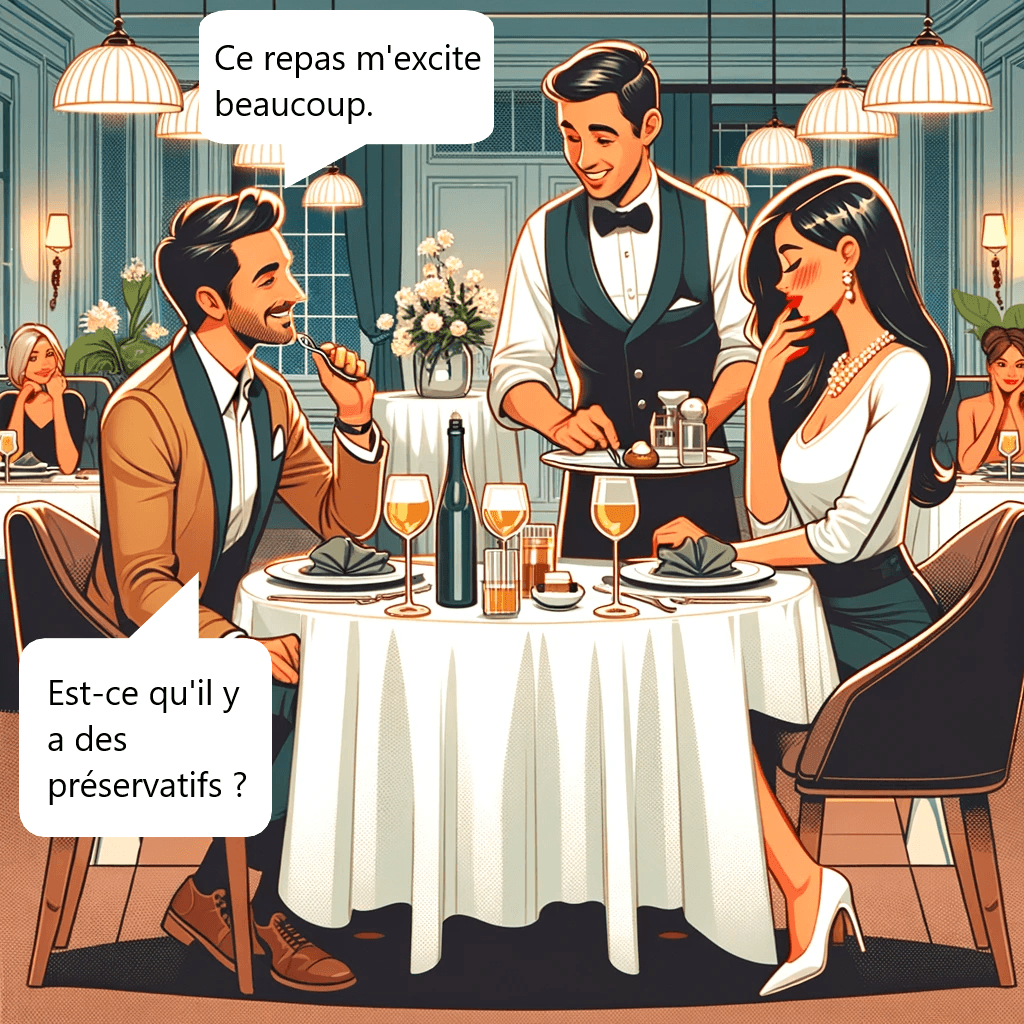
Avoid Errors: 10 Common French False Friends To Master
February 7, 2024
2/7/2024
Hello everyone! Today, we're focusing on 10 false friends in French. But what exactly are false friends? They are words that, in two different languages, look similar in form but differ in meaning. Mastering these false friends helps avoid misunderstandings, communication errors, and sometimes even embarrassing situations.
We will provide a clear explanation for each, the typical mistake to avoid, and of course, the correct translation or usage in French. Is the video enough for you and you're eager to test your knowledge? Go straight to the end of this article 😉
1. Money and "Monnaie"
In French, the word "monnaie" does not refer to money in a general sense, but rather to coins and low-value bills, the equivalent of the English term "change".
To talk about "money" in French in a broad sense, the word "argent" is used.
J'ai besoin de changer de l'argent pour avoir de la monnaie pour le parcmètre.
In this sentence, "argent" refers to money in general, while "monnaie" denotes specific coins for the parking meter.
2. Actually and "Actuellement"
The word "actually" in English can easily mislead when translating into French. Many mistakenly think it translates to "actuellement", whereas it means "now" or "at the present moment" in French.
The correct French expressions for "actually" are "en fait", "en réalité", or "effectivement".
Vous pensez bien faire, mais en réalité, cela pourrait causer des problèmes.
Here, "en réalité" is the correct translation to express a contrary idea or a clarification, and not "actuellement", which would describe a state or action taking place in the present moment. In the following example, "actuellement" is correctly used:
Actuellement, je suis en train de travailler sur un projet important.
3. Location and "Location"
In English, the word "location" denotes a place or position. However, a literal translation into French can lead to confusion with the word "location", which refers to the notion of renting something, like an apartment or a car.
To express the idea of a location or place in French, the correct terms are "un emplacement" or "un endroit".
L'emplacement de l'hôtel est idéale, près de la mer.
In this example, "emplacement" is used to indicate where the hotel is located.
Les prix pour la location des skis ont bien augmenté.
In this case, "location" is correctly used to mean "renting something".
4. Eventually and "Éventuellement"
"Eventually" means that an action will happen at some point in the future, often after a number of events or delays, while "éventuellement" in French expresses a possibility, equivalent to "maybe".
To convey the idea that something will inevitably happen in the future in French, one might use expressions such as "finalement", "en définitive", or "un jour ou l'autre". These terms better capture the sense of "eventually", indicating certainty rather than mere possibility.
Après de nombreux retards, le projet sera finalement lancé l'année prochaine.
This example illustrates the use of "finalement" to indicate that, after several obstacles, the project will come to fruition, thus reflecting the precise meaning of "eventually" in English and avoiding confusion with "éventuellement".
Si tu as du temps libre ce weekend, nous pourrions éventuellement aller voir un film ensemble.
In this sentence, "éventuellement" is used to express uncertainty, it could be replaced with "maybe".
5. Sensible and "Sensible"
In English, "sensible" refers to someone who is reasonable, capable of good judgment. In contrast, "sensible" in French describes someone easily affected by emotions, someone sensitive to feelings.
To express the idea of being sensible in French, one would use "raisonnable" or "sensé".
Il est important d'être raisonnable lorsqu'on prend des décisions.
This example shows the use of "raisonnable" to talk about someone who exhibits good sense.
Elle est très sensible aux histoires émouvantes.
In this case, "sensible" is used to describe a person who deeply feels emotions.
6. Assist and "Assister"
In English, "to assist" means aider, soutenir quelqu'un in an action or task. Meanwhile, "assister" in French suggests the act of being present at an event without necessarily implying active help.
Il va aider son ami à déménager ce weekend.
This example illustrates the meaning of providing help to someone.
Elle va assister à un concert ce soir.
In this case, "assister" is correctly used to indicate attendance at an event.
7. Attend and "Attendre"
"Attend" means to participate or be present at an event, while "attendre" in French means to wait for something or someone.
The French equivalent of "to attend" would be "assister à".
Elle va assister à la réunion demain.
This example shows the correct use to express participation in an event.
J'ai dû attendre deux heures avant son arrivée.
In this case, "attendre" illustrates the action of waiting.
8. Comprehensive and "Compréhensif"
The word "comprehensive" in English, describing something complete or exhaustive, is often confused with "compréhensif" in French. The latter instead qualifies a person who shows understanding or empathy.
To translate "comprehensive" into French, one could use "complet", "exhaustif", or "détaillé".
Ce rapport est très complet et couvre tous les aspects du projet.
This example demonstrates the use of "complet" to qualify something as exhaustive.
Il est toujours compréhensif quand je suis en retard.
Here, "compréhensif" is rightly used to describe an empathetic person.
9. Pass an exam and "Passer un examen"
"Pass an exam" in English means "to succeed in an exam", whereas the phrase "passer un examen" is used to indicate the act of taking an exam, without knowing the outcome.
Il a réussi son examen de mathématiques haut la main.
This example illustrates the use of "réussir" to indicate that someone has successfully passed their exam.
Demain, je dois passer un examen de français.
In this case, "passer" is correctly used to talk about the action of undergoing an exam.
10. Excited and "Excité"
Although "excited" in English and "excité" in French share common roots, the use in French can sometimes lead to confusion due to the sexual connotation the word can also carry.
To translate this feeling of positive excitement in French, one would prefer to use "enthousiaste" or "impatient". However, "excité" can also be used depending on the context.
Je suis vraiment enthousiaste à l'idée de notre rencontre.
This example shows the use of "enthousiaste" to express a state of positive excitement. Using "excité" in this context would be inappropriate.
Il était très excité à l'idée de voir le match.
In this second example, "excité" is employed in a clear context where the connotation is positive and unambiguous.

Let's get serious
Well now that we've covered these false friends, how about learning the vocabulary? It's your turn!
| La monnaie | Change |
| Actuellement | Currently |
| La location | Rental |
| Éventuellement | Possibly |
| Sensible | Sensitive |
| Assister | To attend |
| Attendre | To wait |
| Compréhensif | Understanding |
| Passer un examen | To take an exam |
| Excité | Excited |
| L'argent | Money |
| Maintenant | Now |
| L'emplacement | Location |
| Finalement | Finally |
| Raisonnable | Reasonable |
| Réussir un examen | To pass an exam |
| Excité | Excited |
| Aider | To help |
Flashcards
Shuffle
Swap faces
Loading...
Loading...
Loading...
Conclusion
Understanding and mastering false friends in French is essential to avoid misunderstandings and enrich your vocabulary. We have explored together 10 of these common false friends, highlighting the nuances and correct meanings for each. This learning is a step further towards a deep mastery of the French language.
To continue structuring your French learning, we invite you to discover our video courses on Udemy. With a methodical and structured approach, these courses are designed to guide you through the subtleties of the language and help you build a solid foundation in French.
Moreover, to enrich your vocabulary and practice in a fun way, our blog offers a variety of themes to explore with flashcards and exercises to assist you in your French learning journey.
Learn how to Introduce yourself
See you soon for new linguistic adventures and especially bon courage!

Subscribe to our newsletter
Latest posts
Browse all posts
Subscribe to our newsletter
Stay informed and get a free video

